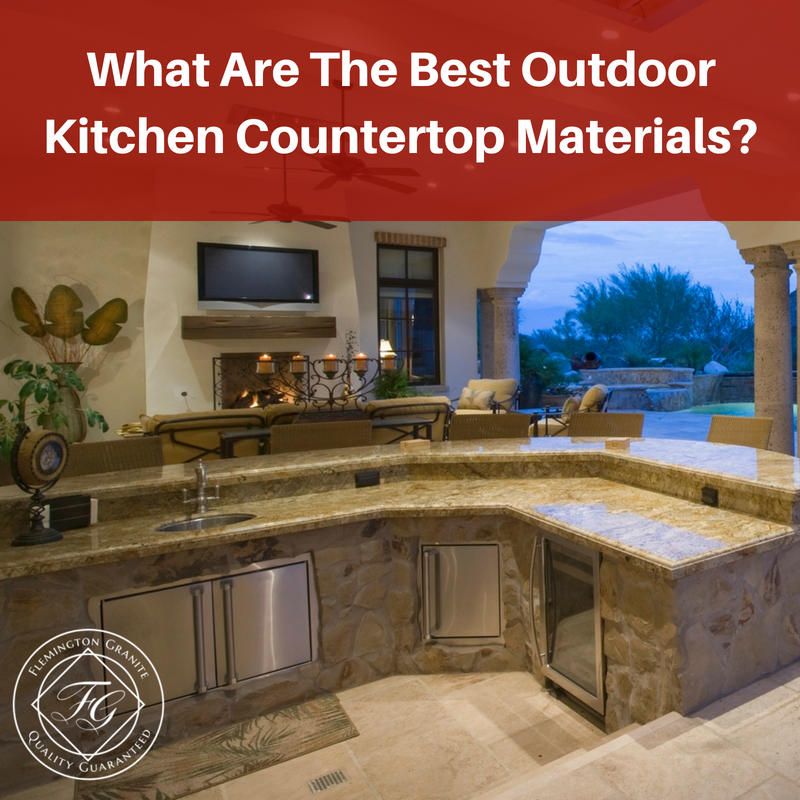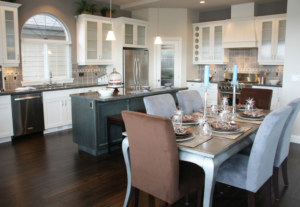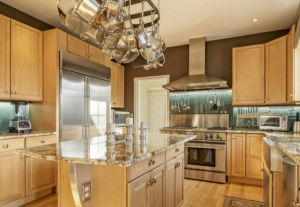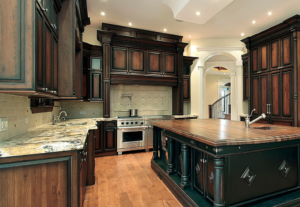
It seems that almost everyone wants an outdoor kitchen or prep area that can become a kind of second kitchen. The rush is on for exterior areas that accommodate the cooking and serving of food in a different setting, but with the push for outdoor kitchens comes the question as to what are the best materials for kitchen countertops that are able to fit in with an outdoor environment?
Selection Challenges
When selecting an outdoor countertop material, there are challenges with finding what is and isn’t fitting for an exterior area. Take a look at those materials that are considered the best outdoor kitchen countertop materials currently available and in use. Before making a choice, consider that the surface of the material should be one that can adapt to both cooking, cleaning and eating as well as one that is more easily maintained and has proven durability and longevity.
Stone Tiles and Slabs
Stone is almost always fitting for outdoor countertop use, but sealing it with an acrylic medium is a necessary step in preparing it for outdoor use. If stone is your choice, speak with a tile specialist as to which particular stone tiles are durable, resistant to stains and strong enough to handle repeated use. In addition, stone in a smooth slab form (about three inches in thickness) doesn’t require added under layers. The walls of the counter will be of support, and they are shaped during fabrication. Limestone is a good example.
Granite
Granite is strong, durable and long-lasting and doesn’t require added surface bolstering, but its overall weight does require professional installation. Granite is a fierce competitor for outside use as it is easy to use and maintain, plus it is available in an array of color choices, shades and patterns that easily coordinate with almost any outdoor patio, barbecue and deck area as well as with exterior furnishings, accessories, plantings and landscaping. Granite is all weather compatible and is resistant to discoloration, etching and loss of luster. Sealing isn’t entirely necessary, particularly if the granite is dense, but sealing will protect from dirt, grime and dust accumulation and acidic food and drink stains, which can eventually lead to more permanent marks. Whether a granite countertop is on the interior or exterior of a home, it does require maintenance and sealing, and regular cleaning will definitely extend the life of an exterior granite countertop.
Ceramic Tile
Tile that is glazed has become popular for outdoor countertop use, as it is durable and fairly easy to maintain. It is less expensive than slab type materials, such as granite, and it is available in a host of colors and sizes that can be nicely finished with edging and corner pieces. There is the drawback of grout getting dirty and staining along with the possibilities of chips, cracks and breaks, but with regular upkeep, ceramic tile can be maintained as well as made to last.
Brick
Brick is not usually thought of as a countertop material, but it has certainly been the foundation for many a barbecue pit. Brick that is used for countertops will be of a smooth yet hard variety and of a size that will easily accommodate most any countertop design. Sealing brick with an acrylic sealant gives it a workable surface and reduces porosity plus makes it resistant to stains. Though rougher and not as easy to maintain, brick brings a rustic look that draws attention to a more rustic outdoor setting.
Concrete
Concrete has gained considerable popularity in use for both indoor and outdoor countertop use. Added texture and unusual color combinations can provide both an industrial and rustic touch to countertops. Concrete is a durable material, yet it can show scratches and nicks, but it is heavy enough that it does not require under layers. Fabrication is usually done with molds, and its installation necessitates the use of professionals to complete the process. Concrete, particularly pieces with ingrained and more vibrant colors have a tendency to fade from sun exposure, so overhead coverage is recommended.
Materials to Avoid
Quartz
Though quartz is competitive with granite, its composition of coloring and resins can cause its surface to yellow and age from exposure to the sun and varying weather conditions.
Corian
Corian is another material that is not suitable for outdoor use. It is a plastic composite material that does not do well with variations in heat and distribution of heat.
If you are contemplating the use of outdoor kitchen countertop materials but aren’t sure which one is the best selection for your exterior area, complete the online contact form and a countertop expert will get back to you with the information you need to determine what the best materials are for your outdoor countertop.






